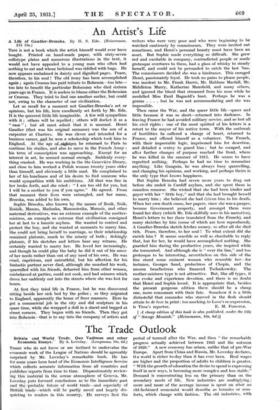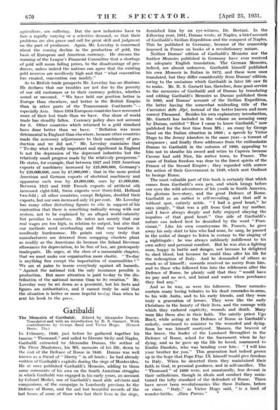The Trade Outlook
Britain and World Trade. Quo Vadimus and other Economic Essays.'". By A. Loveday. (Longman. 10s. 6d.)
THOSE who do not know or are inclined to undervalue the economic work of the League of Nations should be agreeably surprised by Mr. LoVeday's remarkable book. He has for some years been head of the Economic Intelligence Service which collects accurate information from all countries and publishes'reports from time to time. Dispassionately review- ing this material in the serene atmosphere of Geneva, Mr. Loveday puts forward conclusions as to the immediate past and the -probable future of world trade—and especially of British trade—which will be partly novel and largely dis- quieting to readers in this country.' He surveys first the
period of turmoil after the War, and then " the remarkable progress actually achieved between 1925 and the autumn of 1929." A new economy has arisen, unlike that of pre-War Europe. Apart from China and Russia, Mr. Loveday declares, tl e world is richer to-day than it has ever been. Real wages are higher and the proportion of adults to children is greater. " With the growth of education the desire to spend is expressing itself in new ways, is becoming more complex and less stable." Demand is concentrating less on the primary than on the secondary needs of life. New industries are multiplying ; more and more of the average income is spent on what an old-fashioned economist would describe as luxuries or com- forts, which change with fashion. The old industries, with agriculture, are suffering. But the new industries have to face a rapidly varying or a selective demand, so that their problems are also grave and call for great skill and judgment on the part of producers. Again, Mr. Loveday is concerned about the coming decline in the production of gold, the basis of European and American currency. He stresses the warning of the League's Financial Committee that a shortage of gold will mean falling prices, to the disadvantage of pro- ducers, unless indeed the nations can agree that the existing gold reserves are needlessly high and that " what convention has created, convention can modify."
As to British trade prospects Mr. Loveday has no illusions. He declares that our troubles are not due to the poverty of our old customers or to their currency policies, whether sound or unsound. " We have held our position better in Europe than elsewhere, and better in the British Empire than in other parts of the Transoceanic Continents "- especially Asia. Since 1924 European countries have recovered more of their lost trade than we have. Our share of world trade has steadily fallen. Currency policy does not account for it. Other countries which returned to a gold standard have done better than we have. " Deflation was more detrimental in England than elsewhere, because other countries made the necessary adjustments to their machinery of pro- duction and we did not." Mr. Loveday maintains that " To-day what is really important and significant in England is not the depression of the depressed industries but the relatively small progress made by the relatively prosperous." He states, for example, that between 1927 and 1929 American exports of machinery increased by £28,000,000, Germany's by £20,000,000, ours by 17,000,000 ; that in the same period American and German exports of electrical machinery and apparatus each rose by £8,000,000, ours by £1,000,000. Between 1925 and 1929 French exports of artificial silk increased eight-fold, Swiss exports over three-fold, Holland two-fold ; all other countries, except Belgium, doubled their exports, but our own increased only 13 per cent. Mr. Loveday has many other disturbing figures to cite in support of his contention that there is something radically wrong with our system, not to be explained by an alleged world-calamity but peculiar to ourselves. He infers not merely that our real wages are too high, in relation to output, but also that our methods need overhauling and that our taxation is needlessly burdensome. He points out very truly that manufacturers are detened from scrapping obsolete plant as readily as the Americans do because the Inland Revenue allowances for depreciation, to be free of tax, are grotesquely inadequate. He urges, at the close of a memorable chapter, that we must make our organization more elastic. To-day is anything free except the importation of commodities ? " We are at pains to insure everybody against all hazards. " Against the national risk the only insurance possible is production. But more attention is paid today to the dis- tribution of the national income than to its creation." Mr. Loveday may be set down as a pessimist, but his facts and figures are authoritative, and it cannot truly be said that the situation is better or more hopeful to-day than when he sent his book to the press.







































 Previous page
Previous page